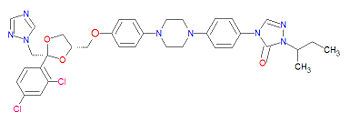Itraconazole: Difference between revisions
imported>Caesar Schinas m (Bot: Replacing medical templates with CZMed) |
imported>Caesar Schinas m (Bot: Update image code) |
||
| (One intermediate revision by the same user not shown) | |||
| Line 2: | Line 2: | ||
{{Chem infobox | {{Chem infobox | ||
|align=right | |align=right | ||
|image= | |image={{Image|Itraconazole structure.jpg|center|350px|Itraconazole, a triazole-based antifungal agent.}} | ||
|width=350px | |width=350px | ||
|molname=itraconazole | |molname=itraconazole | ||
| Line 47: | Line 47: | ||
== References and external links == | == References and external links == | ||
<references/> | <references/> | ||
Latest revision as of 08:21, 8 June 2009
|
| |||||||
| itraconazole | |||||||
| |||||||
| Uses: | antifungal drug | ||||||
| Properties: | triazole compound | ||||||
| Hazards: | see drug interactions | ||||||
| |||||||
Itraconazole is an azole-based antifungal drug containing three azoles, like fluconazole. It inhibits cytochrom P450-dependent enzymes and impairs the biosynthesis of ergosterol. It can be used to treate apergillosis, blasoplasmosis, cryptococcal meningitis, histoplasmosis and onychomycosis.
Mechanism of action
Like other azole-based antifungal agents, itraconazole interacts with 14--demethylase, a cytochrome P-450 enzyme necessary to convert lanosterol to ergosterol, an essential component of fungal cell membranes, by stopping sterol C-14 -demethylation. Itraconazole may also inhibit endogenous respiration, interact with membrane phospholipids, inhibit the transformation of yeasts to mycelial forms, inhibit purine uptake, and impair triglyceride and/or phospholipid biosynthesis[1].
Drug interactions
The azole-based antifungal agents have many drug interactions and some can be sever. This section is under construction, see ketoconazole for a partial list of drug interactions.
Chemical information
The IUPAC name for itraconazole is 2-butan-2-yl-4-[4-[4-[4-[[(2R,4S)-2-(2,4-dichlorophenyl)-2-(1,2,4-triazol-1-ylmethyl)-1,3-dioxolan-4-yl]methoxy]phenyl]piperazin-1-yl]phenyl]-1,2,4-triazol-3-one, and its chemical formula, C35H38Cl2N8O4, gives a molecular mass of 705.6334 g/mol.
Synonyms
- ITC
- ITCZ
- ITR
- Itraconazol
- Itraconazolum
- ITZ
Brand names
- Itrizole®
- Oriconazole®
- Sporal®
- Sporanos®
- Sporanox®
- Sporonox®
- Triasporn®
References and external links
- ↑ The most up-to-date information about Itraconzole and other drugs can be found at the following sites.
- Itraconzole - FDA approved drug information (drug label) from DailyMed (U.S. National Library of Medicine).
- Itraconzole - Drug information for consumers from MedlinePlus (U.S. National Library of Medicine).
- Itraconzole - Detailed information from DrugBank.

